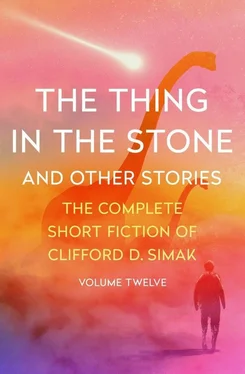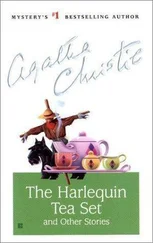Bill’s jaw fell
“The sun,” he said.
“Yes, the sun,” said Harl.
They stared at one another in the half-light.
“Then this isn’t the year 7561,” stammered Bill.
“No, more likely the year 750,000, perhaps even more than that.”
“The time dial was wrong then.”
“It was wrong. Badly wrong. We were traveling through time a thousand times faster than we thought.”
They were silent, studying the landscape about them. They saw only ruins which towered hundreds of feet above the sands. They were ruins of noble proportions, many of them still bearing the hint of a marvelous architecture of which the twentieth century would have been incapable. The stone was pure white, gleaming beautifully in the twilight the feeble rays of the great brick-red sun could not dispel.
“The time dial,” said Bill, thoughtfully, “was registering thousands of years instead of years.”
Harl nodded cheerlessly.
“Maybe,” he said. “For all we know it may have been registering tens of thousands of years.”
A creature, somewhat like a dog, dull gray in color, with tail hanging low, was silhouetted for a moment on a sand dune and then disappeared.
“These are the ruins of Denver,” said Harl. “That sea we saw must cover the whole of eastern North American. Probably only the Rocky Mountains remain unsubmerged and they are a desert. Yes, we must have covered at least 750,000 years, perhaps seven million.”
“What about the human race? Do you think there are any people left?” asked Bill.
“Possibly. Man is a hardy animal. It takes a lot to kill him and he could adapt himself to almost any kind of environment. This change, you must remember, came slowly.”
Bill turned about and his cry rang in Harl’s ear. Harl whirled.
Running toward them, leaping over the sands, came a motley horde of men. They were dressed in furs and they carried no weapons, but they charged down upon the two as if to attack.
Harl yanked his .45 from its holster. His great hand closed around the weapon and his finger found the trigger. It gave him a sense of power, this burly six-shooter.
The men, their furs flying behind them, were only a hundred yards away. Now they yelled, blood-curdling, vicious whoops which left no doubt that they were enemies.
No weapons. Harl grinned. They’d give ’em hell and plenty of it. There were about fifty in the mob. Big odds, but not too great.
“We might as well let them have it,” he said to Bill. The two guns roared. There was disorder in the running ranks, but the mob still forged ahead, leaving two of its members prone on the ground. Again the .45’s barked, spurting a stream of fire.
Men staggered, screaming, to collapse. The rest hurdled them, raced on. It seemed nothing could stop them. They were less than fifty feet away.
The guns were empty. Swiftly the two plucked cartridges from their belts and reloaded.
Before they could fire the mob was on top of them. Bill thrust his gun into the face of a running foeman and fired. He had to sidestep quickly to prevent the fellow tumbling on top of him. A knotted fist connected with his head and he slipped to his knees. From that position he drilled two more of the milling enemies before they piled on top of him.
Through the turmoil he heard the roar of Harl’s gun.
He felt the grip of many hands, felt bodies pressing close about him. He fought blindly and desperately.
He fought with hands, with feet, with suddenly bared teeth. He felt bodies wilt under his blows, felt blood upon his hands. The sand, kicked up by many feet, got into his nostrils and eyes, half strangling, half blinding him.
Only a few feet away Harl fought, fought in the same manner as his companion. With their weapons knocked from their hands they resorted to the tactics of their ancient forebears.
It seemed minutes that they battled with their attackers, but it could not have been more than seconds before the sheer weight of numbers subdued them, wound thongs tightly about their hands and feet and left them, trussed like two fowls ready for the grid.
“Hurt, Bill?” called Harl.
“No,” replied Bill. “Just mussed up a bit.”
“Me, too,” said Harl.
They lay on their backs and stared up at the sky. Their captors moved away and massed about the plane.
A loud banging came to the ears of the two. Evidently the others were trying to force an entrance into the machine.
“Let them bang,” said Harl. “They can’t break anything.”
“Except a propeller,” replied Bill.
After more banging, the men returned and untying the bonds on the feet of the captives, hoisted them up.
For the first time they had an opportunity to study their captors. They were tall men, well proportioned, clean of limb, with the stamp of well-being about them. Aside from their figures, however, they held a distinctly barbarous appearance. Their hair was roughly trimmed, as were their beards. They walked with a slouch and their feet shuffled in the sand with the gait of one who holds a purposeless existence. They were dressed in well-tanned furs, none too clean. They bore no arms and their eyes were the eyes of furtive beings, shifty, restless, as are the eyes of hunted beasts, always on the lookout for danger.
“March,” said one of them, a large fellow with a protruding front tooth. The single word was English, with the pronunciation slightly different than it would have been in the twentieth century, but good, pure English.
They marched, flanked on either side by their captors. The march led back over the same route as the future-men had come. They passed the dead, but no attention was paid them, their comrades passing the sprawled figures with merely a glance. Life apparently was cheap in this place.
CHAPTER II
Orders of Golan-Kirt
They passed between monstrous ruins. The men talked among themselves, but, although the tongue was English, it was so intermixed with unfamiliar words and spoken with such an accent that the two could understand very little of it.
They reached what appeared to be a street. It led between rows of ruins and now other humans appeared, among them women and children. All stared at the captives and jabbered excitedly.
“Where are you taking us?” Bill asked a man who walked by his side.
The man ran his fingers through his beard and spat in the sand.
“To the arena,” he said slowly that the twentieth century man might understand the words.
“What for?” Bill also spoke slowly and concisely.
“The games,” said the man, shortly, as if displeased at being questioned.
“What are the games?” asked Harl.
“You’ll find out soon enough. They are held at high sun today,” growled the other. The reply brought a burst of brutal laughter from the rest.
“They will find out when they face the minions of Golan-Kirt,” chortled a voice.
“The minions of Golan-Kirt!” exclaimed Harl.
“Hold your tongue,” snarled the man with the protruding tooth, “or we will tear it from your mouth.”
The two time-travelers asked no more questions.
They plodded on. Although the sand beneath their feet was packed, it was heavy going and their legs ached. Fortunately the future-men did not hustle their pace, seeming to be content to take their time.
A good sized crowd of children had gathered and accompanied the procession, staring at the twentieth century men, shrieking shrill gibberish at them. A few of them, crowding too close or yelling too loudly, gained the displeasure of the guards and were slapped to one side.
For fifteen minutes they toiled up a sandy slope. Now they gained the top and in a depression below them they saw the arena. It was a great building, open to the air, which had apparently escaped the general destruction visited upon the rest of the city. Here and there repairs had been made, evident by the decidedly inferior type of workmanship.
Читать дальше












